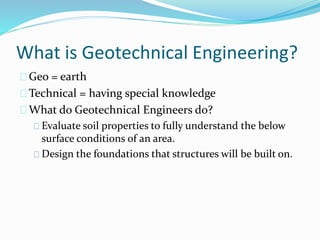Rumored Buzz on Geotheta
Rumored Buzz on Geotheta
Blog Article
Unknown Facts About Geotheta
Table of ContentsGeotheta Fundamentals Explained7 Easy Facts About Geotheta Described3 Simple Techniques For GeothetaGeotheta Can Be Fun For EveryoneFacts About Geotheta Uncovered

They perform website examinations, collect examples, execute research laboratory tests, and assess information to examine the viability of the ground for building tasks - Consulting Engineer. Based on their searchings for, geotechnical designers provide recommendations for structure design, incline stability, preserving structures, and reduction of geotechnical threats. They collaborate with other specialists, such as engineers, architectural designers, and building groups, to guarantee that geotechnical considerations are incorporated right into the general project design and application
By assessing the actions and properties of dirt and rock, they can recognize potential geotechnical threats such as landslides, soil settlement, or slope instability. Their knowledge aids avoid failings or crashes that could jeopardize lives and home. Below are some in-depth duties and obligations of a geotechnical designer: Website Examination: Geotechnical engineers conduct website investigations to gather information on subsurface conditions.
They analyze the data to recognize the residential or commercial properties and habits of the dirt and rock, including their strength, leaks in the structure, compaction characteristics, and groundwater problems. Geotechnical Analysis and Layout: Geotechnical engineers assess the information collected during website examinations to evaluate the security and suitability of the site for construction projects. They carry out geotechnical estimations and modeling to review elements such as birthing capacity, settlement, incline security, side earth stress, and groundwater circulation.
Geotheta Things To Know Before You Buy
Structure Design: Geotechnical designers play a critical duty in designing foundations that can safely sustain the designated structure. They examine the soil conditions and load demands to figure out the proper foundation kind, such as superficial foundations (e.g., grounds), deep structures (e.g (https://issuu.com/geotheta)., piles), or specialized strategies like soil renovation. They think about aspects such as settlement limits, bearing capacity, and soil-structure communication to establish optimum foundation designs
They evaluate building and construction plans, display site tasks, and conduct area examinations to confirm that the design recommendations are followed. If unpredicted geotechnical issues develop, they evaluate the situation and offer suggestions for remediation or changes to the design. Risk Analysis and Reduction: Geotechnical engineers analyze geotechnical risks and threats connected with the job website, such as landslides, liquefaction, or soil disintegration.

Collaboration and Communication: Geotechnical designers function carefully with various other specialists associated with a project, such as architects, architectural designers, and building teams. Reliable communication and partnership are important to integrate geotechnical considerations right into the overall project style and building and construction procedure. Geotechnical engineers provide technological experience, answer questions, and ensure that geotechnical requirements are met.
The smart Trick of Geotheta That Nobody is Discussing
Below are some kinds article source of geotechnical designers: Foundation Designer: Structure designers focus on designing and evaluating structures for structures. They assess the dirt problems, tons demands, and website attributes to identify one of the most appropriate foundation type and layout, such as superficial structures, deep foundations, or specialized techniques like pile foundations.
They examine the variables influencing slope security, such as dirt buildings, groundwater problems, and incline geometry, and create techniques to stop slope failings and reduce threats. Quake Engineer: Quake designers specialize in examining and designing frameworks to withstand seismic pressures. They analyze the seismic danger of a website, evaluate dirt liquefaction potential, and develop seismic style criteria to make sure the safety and security and durability of structures during earthquakes.
They do area screening, gather samples, and analyze the accumulated information to identify the dirt properties, geologic formations, and groundwater conditions at a website. Geotechnical Instrumentation Designer: Geotechnical instrumentation designers concentrate on surveillance and determining the actions of soil, rock, and structures. They install and preserve instrumentation systems that check aspects such as dirt settlement, groundwater degrees, incline activities, and structural variations to evaluate efficiency and supply very early cautions of potential issues.
The smart Trick of Geotheta That Nobody is Discussing
They conduct tests such as triaxial tests, debt consolidation examinations, direct shear examinations, and permeability tests to collect information for geotechnical analysis and style. Geosynthetics Engineer: Geosynthetics designers focus on the style and application of geosynthetic materials, such as geotextiles, geogrids, and geomembranes. They make use of these products to enhance soil stability, enhance inclines, offer drain options, and control erosion.
They often tend to be investigative people, which means they're intellectual, reflective, and curious. They are interested, methodical, logical, logical, and logical. Some of them are likewise social, implying they're kind, charitable, participating, person, caring, valuable, empathetic, tactful, and friendly - Consulting Engineer.
In the workplace environment, geotechnical designers make use of specialized software application tools to execute calculations, create styles, and evaluate data. They prepare records, testimonial job requirements, interact with customers and staff member, and coordinate project tasks. The workplace setting gives a helpful environment for study, evaluation, and cooperation with other professionals entailed in the task.
Getting My Geotheta To Work
They often check out task sites to conduct website investigations, evaluate geotechnical problems, and gather information for evaluation. These gos to involve taking a trip to different locations, in some cases in remote or tough terrains. Geotechnical engineers may perform soil sampling, conduct examinations, and monitor building tasks to make sure that the geotechnical elements of the task are being carried out properly.
Geotechnical designers likewise function in specialized geotechnical labs. Geotechnical research laboratory engineers function thoroughly in these atmospheres, handling testing devices, running instruments, and taping information.
Report this page